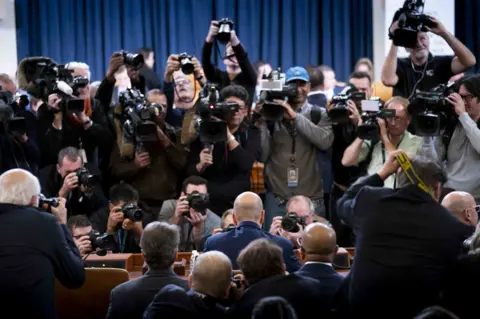Impeachment inquiry: A bombshell for President Trump

With his opening statement to the House impeachment hearings on Wednesday, Gordon Sondland fired a torpedo that has blown a hole in the White House's defences.
Water is rushing in, and it's now a question of whether Republican senators will once again give Donald Trump a lifeboat before his presidency disappears beneath the waves.
Sondland, the US ambassador to the EU, was working with Donald Trump's personal lawyer, Rudy Giuliani, on Ukrainian policy at the explicit direction of the president.
There was a quid-pro-quo. A White House visit for Ukrainian President Volodymyr Zelensky was directly conditioned on opening investigations that could help the president politically. Sondland also came to believe that US military aid to Ukraine was also being held up for this reason.
Everyone at the White House - acting Chief of Staff Mick Mulvaney, Secretary of State Mike Pompeo, former National Security Advisor John Bolton and others - was "in the loop".
The word "bombshell" gets thrown around a lot these days, but Sondland's testimony, which represents a shift from his earlier closed-door statements, is a watershed moment in these impeachment investigations.
With Gordon Sondland going on record saying that his Ukrainian activities were done at the direction of Donald Trump, in co-ordination with Rudy Giuliani, it would seem much harder now for the president to say he "hardly knows" Sondland or deny he had repeated interactions with him.
In comments at the White House during Sondland's testimony, however, the president stuck by this insistence.
"That is not a man I know well," Trump said.
Sondland, the president noted, also made clear that Trump had told him he wanted "nothing" from the Ukrainians and that there was no "quid pro quo".
The problem for the president is that while that conversation may have been helpful in his defence, much of the remainder of Sondland's testimony was extremely damaging. While the president may not have directly spoken of conditioning a White House visit or military aid on Ukrainian investigations, Sondland said it was clear to him that this was the president's intent.
It will be next to impossible for Mr Trump and his supporters to paint Sondland - who was talking about quid pro quos - as a foreign policy freelancer who was operating on his own and not at the behest of the president.
The president's defenders may suggest Sondland is making things up or that his memory is off - although he provided documents supporting his assertions and other testimony backs his latest accounts.
For instance others have testified, and Sondland confirmed, that Sondland had a phone conversation on 26 July with the president where they discussed "investigations".
 Getty Images
Getty ImagesThe only real defence left for the president may be to assert broad powers to conduct foreign policy, including pressuring leaders to investigate whomever the president wants.
If the president wanted Ukraine to look into debunked allegations of 2016 election meddling or suggestions of misconduct by the Bidens, he could use all the tools of foreign policy to achieve that goal.
The "there's going to be political influence in foreign policy ... there's no problem with that" defence was first floated, and then retracted, by acting White House Chief-of-Staff Mulvaney at a press conference in October.
Start the countdown to when that will be the White House's position once again. The damage, however, is already done.

Learn more about Trump and impeachment inquiry

- SIMPLE GUIDE: A basic take on what's going on
- GO DEEPER: Here's a 100, 300 and 800-word summary of the story
- WHAT'S IMPEACHMENT? A political process to remove a president
- VIEW FROM TRUMP COUNTRY: Hear from residents of a Pennsylvania town
- ON THE DOORSTEP: A Democrat sells impeachment to voters
- FACT-CHECK: Is the whistleblower linked to Democrats?
- CONTEXT: Why Ukraine is important to the US

